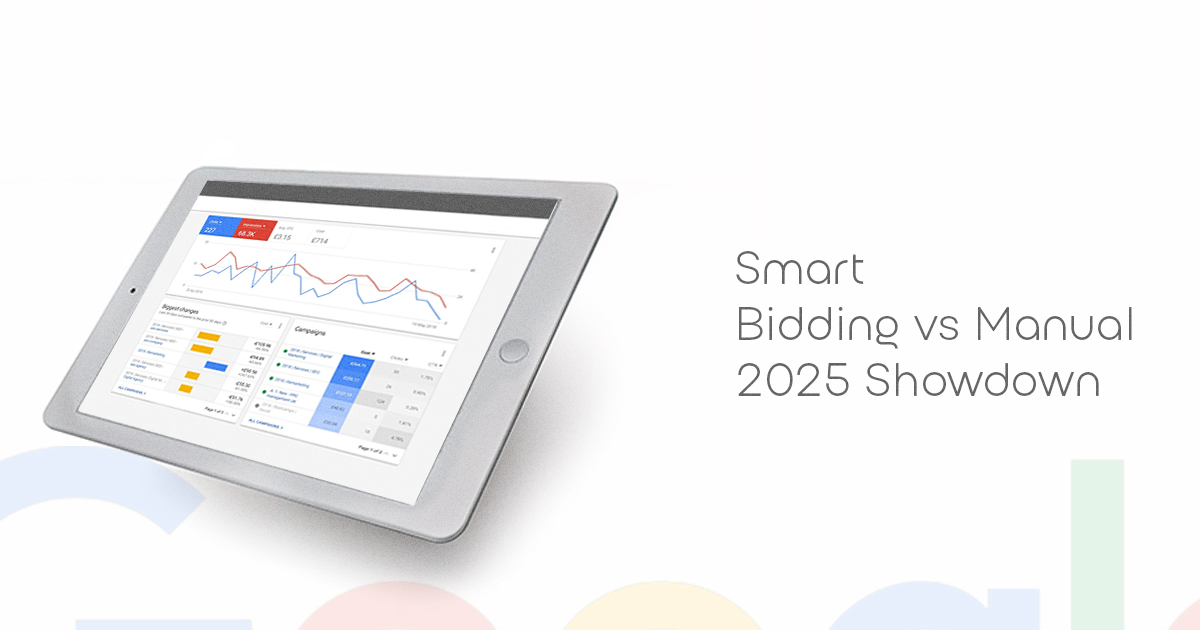In the world of Google Ads, one of the most debated questions remains: Should you use Smart Bidding or Manual Bidding? With Google’s algorithms becoming increasingly powerful, 2025 is a turning point for advertisers who want to maximize their ROI.
Whether you’re a small business or a seasoned brand, choosing the right bidding strategy can be the difference between scaling profitably or burning your ad budget. That’s why many brands consult a ppc advertising agency to help them make the best decision.
In this blog, we’ll break down the pros and cons of Smart vs Manual Bidding, highlight what’s changed in 2025, and explain how to choose the strategy that fits your goals.
What Is Smart Bidding?
Smart Bidding is Google’s automated bidding strategy powered by machine learning. It uses real-time signals like device, location, time, and user intent to adjust your bids automatically.
Key Smart Bidding Strategies:
- Target CPA (Cost Per Acquisition)
- Target ROAS (Return on Ad Spend)
- Maximize Conversions
- Maximize Conversion Value
- Enhanced CPC
Why It’s Popular in 2025:
- Google’s AI has matured significantly.
- More accurate predictions based on real-time signals.
- Reduced human error and faster optimizations.
- Seamless integration with performance tracking tools.
What Is Manual Bidding?
Manual Bidding gives you full control over your keyword-level bids. Advertisers set bids based on their own research, industry benchmarks, and past performance.
Benefits of Manual Bidding:
- Total control over your max CPC.
- Granular adjustments based on keyword, device, or audience.
- Ideal for tight budgets and niche campaigns.
Smart Bidding in 2025: What’s New?
Google has been pushing Smart Bidding aggressively over the last few years — and for good reason. In 2025, it’s smarter, faster, and more contextual than ever.
New Capabilities:
- AI-driven audience modeling for better predictions.
- Predictive data layering using user behavior trends.
- Dynamic ad scheduling based on engagement patterns.
However, automated doesn’t always mean better — and that’s where strategic decision-making from a skilled ppc advertising agency becomes crucial.
Smart Bidding vs Manual Bidding: Pros & Cons
| Feature | Smart Bidding | Manual Bidding |
| Control | Low – AI decides bids | High – You decide bids |
| Learning Curve | Easy setup, but needs trust | Steeper, needs data literacy |
| Efficiency | High for large-scale campaigns | Time-consuming |
| Optimization Speed | Fast (real-time adjustments) | Slower (based on manual changes) |
| Best For | Large accounts, dynamic goals | Small budgets, stable campaigns |
| AI Dependency | High | Low |
When to Use Smart Bidding
Smart Bidding is ideal when:
- You have consistent conversion tracking in place.
- Your campaign has collected enough historical data.
- Your goals include scaling reach and automating optimization.
- You’re running eCommerce, app installs, or high-volume campaigns.
Pro Tip from a PPC Advertising Agency:
Start with “Maximize Conversions” for new accounts, then move to Target CPA or Target ROAS as data matures.
When to Use Manual Bidding
Manual Bidding is still useful when:
- You’re testing new keywords or ad groups.
- You have a limited budget and want precise control.
- Your campaign is too niche for Google’s algorithm to interpret.
- You’re running experiments or one-time promotions.
Ideal for:
- Local service businesses
- B2B campaigns with long sales cycles
- Accounts without conversion tracking
A Hybrid Approach: What Top Agencies Use
The best strategy in 2025 often combines both bidding models.
Example Approach:
- Start with Manual Bidding to gather data.
- Switch to Smart Bidding once enough conversions are collected.
- Run A/B testing between Enhanced CPC vs Target CPA.
- Use Manual Bidding for branded terms and Smart Bidding for broad match.
This hybrid approach allows for data-driven control and algorithmic efficiency — something only an experienced ppc advertising agency can implement effectively.
Key Considerations Before Choosing
- Data Volume: Smart Bidding needs at least 30 conversions/month.
- Goal Clarity: Do you want more traffic, leads, or revenue?
- Ad Budget: Automation benefits scale better with larger budgets.
- Time & Resources: Manual Bidding demands ongoing attention.
- Tracking Accuracy: Poor data = poor AI performance.
Why Partner with a PPC Advertising Agency?
Choosing a bidding strategy isn’t just about flipping a switch — it’s about aligning with your campaign goals, audience behavior, and competitive landscape.
The right ppc advertising agency:
- Monitors bidding performance daily.
- Switches between strategies as campaigns evolve.
- Implements bidding rules, scripts, and real-time tracking.
- Optimizes beyond just clicks — focusing on conversions and profitability.
At EON8, we specialize in crafting custom Google Ads strategies tailored to your growth goals. Whether Smart or Manual, we test, refine, and scale what works.
Conclusion
In 2025, both Smart and Manual Bidding have their place in your Google Ads toolbox. The best choice depends on your data, goals, and level of control you want.
✅ Use Smart Bidding to scale fast with automation.
✅ Use Manual Bidding for fine-tuned control and precision.
✅ Let a seasoned ppc advertising agency guide your decision and manage your campaigns effectively.
Want better ROI from your Google Ads?
Contact EON8 – Your trusted PPC advertising agency to optimize your bidding strategy today.
